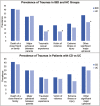Differentiating Childhood Traumas in Inflammatory Bowel Disease
- PMID: 37811528
- PMCID: PMC10558189
- DOI: 10.1093/jcag/gwad026
Differentiating Childhood Traumas in Inflammatory Bowel Disease
Abstract
Background: Inflammatory bowel disease is characterized by chronic inflammation of the gastrointestinal tract. Research on inflammatory bowel disease has shown a connection to childhood traumatic events. However, few studies have focused on specific types of traumatic experiences and the impact of confiding in others on disease-related outcomes. This comparative, cross-sectional study expected that: (1) patients would report higher prevalence rates of childhood traumas than healthy controls; (2) healthy controls would report fewer and less severe traumatic experiences than patients and less confiding in others compared to patients; (3) childhood trauma severity would be indirectly related to depressive symptoms through resilience and confiding in others would moderate this relationship.
Methods: Participants completed an online survey; an inflammatory bowel disease patient group (N = 195, Mage = 40.48, 76.4% female) was compared to a similarly recruited sample of healthy controls (N = 190, Mage = 31.16, 59.5% female).
Results: Patients reported a higher prevalence of experiencing sexual traumas (P = .031), major upheavals (i.e., disruptions) (P = .048), and violence (P = .050) than controls. Patients had significantly higher total trauma severity odds ratios (OR 0.89, 95% CI[0.81,0.97]) and significantly lower total confiding in other odds ratios than controls (OR 1.09, 95% CI[1.02,1.16]). Childhood trauma severity was indirectly related to depressive symptoms through resilience, b = .05, SE = 0.09, 95% CI[0.01,0.09]; however, confiding did not moderate this relationship.
Conclusions: Patients reported more sexual, disruptive, and violent traumas. Although confiding did not act as a moderator, trauma was related to depressive symptoms through resilience.
Keywords: childhood trauma; confiding; depressive symptoms; healthy controls (HC); inflammatory bowel disease (IBD); resilience.
© The Author(s) 2023. Published by Oxford University Press on behalf of the Canadian Association of Gastroenterology.
Conflict of interest statement
The authors have no conflicts of interest.
Figures


References
LinkOut - more resources
Full Text Sources
